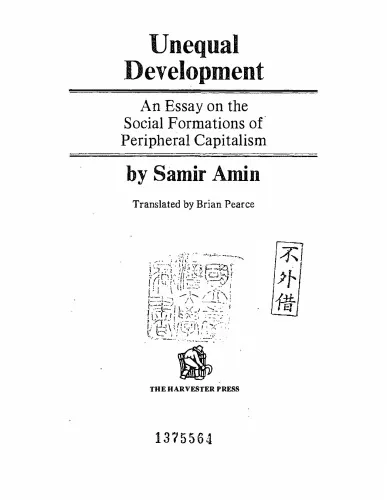Unequal Development: An Essay on the Social Formations of Peripheral Capitalism
4.5
Reviews from our users

You Can Ask your questions from this book's AI after Login
Each download or ask from book AI costs 2 points. To earn more free points, please visit the Points Guide Page and complete some valuable actions.Related Refrences:
Introduction to 'Unequal Development: An Essay on the Social Formations of Peripheral Capitalism'
"Unequal Development: An Essay on the Social Formations of Peripheral Capitalism" is a seminal work by Samir Amin that delves into the complexities of global economic disparities. As a centerpiece of dependency theory, this book explores the intrinsic mechanisms of capitalism that perpetuate inequality between central and peripheral nations. By examining both historical and contemporary contexts, Amin provides a comprehensive analysis of how economic and social structures contribute to uneven development across the globe.
Detailed Summary of the Book
The essence of "Unequal Development" lies in its critical exploration of how capitalist systems inherently lead to disparities between what Amin terms as "center" and "peripheral" countries. The center countries, primarily the developed nations, are depicted as leveraging their economic and political power to maintain dominance over the peripheral nations, often former colonies or less developed countries.
Amin argues that development in capitalist societies is not homogenous or equitable. Rather, it is skewed by structures that promote the enrichment of the center at the expense of the periphery. He delves into the historical roots of these imbalances, tracing them back to colonial exploitation and the imposition of capitalist economic models that favor the center. Through the lens of political economy, Amin dismantles the myth of harmonious global development, showing instead that the system is rigged to preserve and perpetuate inequalities.
In his analysis, Amin highlights how trade imbalances, exploitative labor practices, and unequal capital flows all serve to widen the gap between rich and poor nations. He also explores the social formations that arise from these economic conditions, including the alteration of class structures within peripheral nations as a direct consequence of external economic pressures.
Key Takeaways
The concept of "peripheral capitalism" is critical to understanding global inequality, where peripheral countries remain subservient to central powers.
Historical context, such as colonialism, plays a crucial role in shaping current economic disparities.
Capitalism inherently generates unequal development, with the benefit of wealth accrual largely accruing to developed nations.
Structural reforms, rather than superficial aid, are necessary for truly equitable development.
Famous Quotes from the Book
"Development is a structured, unequal, and imbalanced process where some regions exploit others."
"The fantasy of a world market is dangerous because it ignores the power dynamics embedded within."
Why This Book Matters
Samir Amin's "Unequal Development" is not merely an academic treatise; it is a call to acknowledge and address the persistent inequalities enforced by global capitalism. The book provides a critical framework for policy-makers, scholars, and activists to understand and challenge the mechanisms that perpetuate underdevelopment. Its insights into the structural facets of global capitalism remain relevant to current debates on inequality, globalization, and economic justice.
In the wake of increasing globalization and its associated challenges, "Unequal Development" offers a crucial perspective on why some nations thrive while others struggle. Amin's incisive critique empowers readers to question accepted economic narratives and seek more equitable pathways to global development.
Free Direct Download
You Can Download this book after Login
Accessing books through legal platforms and public libraries not only supports the rights of authors and publishers but also contributes to the sustainability of reading culture. Before downloading, please take a moment to consider these options.
Find this book on other platforms:
WorldCat helps you find books in libraries worldwide.
See ratings, reviews, and discussions on Goodreads.
Find and buy rare or used books on AbeBooks.
1357
بازدید4.5
امتیاز50
نظر98%
رضایتReviews:
4.5
Based on 0 users review
"کیفیت چاپ عالی بود، خیلی راضیام"



